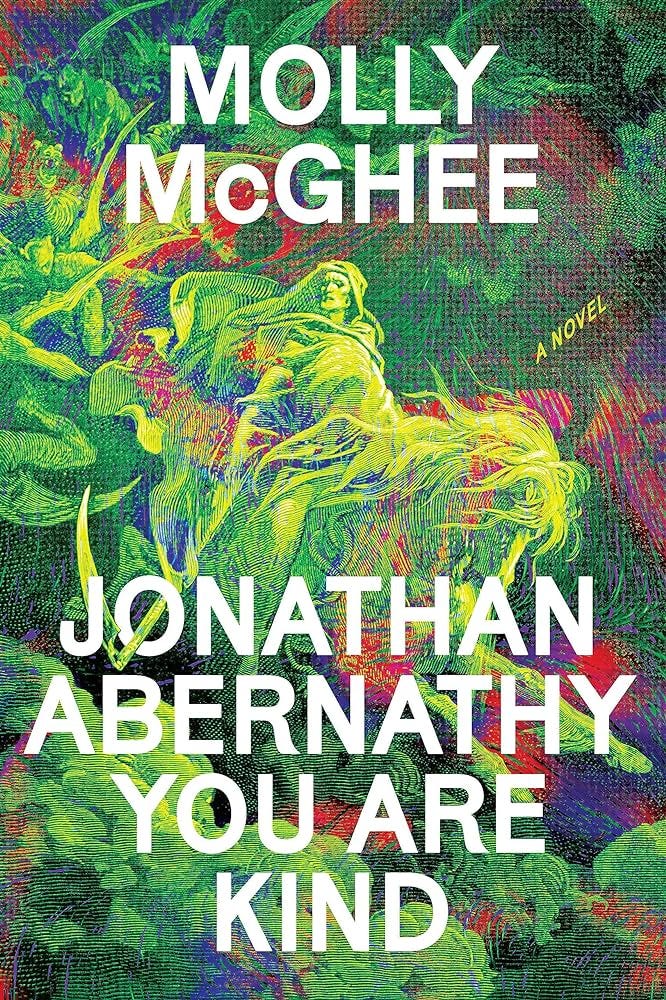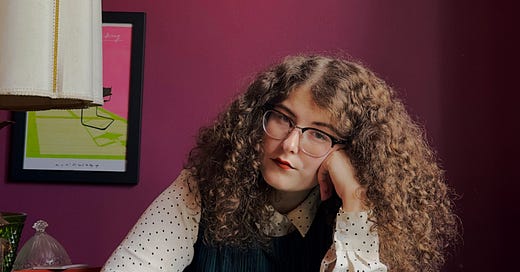I Am Anxious... Molly McGhee
The debut author discusses the excruciating feeling of public panic attacks, grappling with the complexity of existence, and "obsessively" writing and reading fiction.
Molly McGhee is from a cluster of unincorporated towns outside of Nashville, Tennessee. She completed her M.F.A. in fiction at Columbia University, where, in addition to receiving a Chair’s Fellowship, she taught in the undergraduate creative writing department. Her debut novel, Jonathan Abernathy You Are Kind, was recently released.

You can find her on Instagram, Twitter, Facebook, and on her website.
How long have you been an anxious person?
As long as I’ve been sentient.
What is your earliest memory of being anxious?
I answered this question, but it was a little too dark to share and I think the general vibe of this newsletter is supposed to be more hopeful. Some days are more hopeful for others than for me. So I have deleted my initial answer. I will try again.
Adults often underestimate the capacity for children to feel dark, complex feelings. We want to protect children from the world. But the world is complicated, and children are part of it. Eventually all children grow up, often sooner than their parents hoped for, and in growing up grapple with the dark complexity of existence. When I remember my childhood, I remember a lot of grappling. I was very religious. I spent a lot of time staring up at the sky wondering why being alive hurt so much.
Have you ever experienced a panic attack?
Yes. Public attacks are the most excruciating. The embarrassment alone . . . I would pay someone a lot of money to never experience one again.
What are some of your anxiety triggers? What makes you most anxious?
I feel embarrassed of and protective of my little neurosis, so I will instead answer this question on the existential level instead of the physical level.
I tend to find myself grappling with the basics like: what does it mean to "be alive," how does one "exist harmoniously amongst others," will I "live to see another day?," does it "matter if I do?," is there a way to "cherish" my life instead of feeling debilitated by it, is existence "what it appears to be" or is there something "else?"
Simple questions, really.
And yet.
How do you feel physically and emotionally when you’re anxious?
I’m not a health care professional, but I pay them a lot of money in order to understand why I have this sticky, wet feeling in my heart, if it’s imagined or if I have hot stones in my stomach that turn on their own, why it is that though no one’s touching me there’s the nauseating sensation of stranger’s fingers going lightly up and down my arm. When I walk into a room, is that a a fish in my throat, beating its tail against my tongue, or is it something imagined? If it is imagined does that mean, necessarily, that it is not real?
The climate of my emotional interior is damp, muggy, and always oscillating wildly between too hot and too cold. Amazing that anything lives there.
What do you do when you feel anxious? How do you take care of yourself in those situations? Do you have any anxiety management tips or tricks?
I obsessively write and read fiction. I also partake in family traditions, such as marijuana usage (legal now, thanks), using up all the hot water, drinking Diet Cokes, going on long walks in the rain, and shooting the shit while someone else blows smoke in my face. Oh, also, I think this is probably relevant: I am in love. That does a great deal of good for the heart.
How do you feel your anxiety affects your family, friends, and overall social life?
My sister and I are disaster twins. We have enviable imaginations that often veer into the dark, obsessive, and weird. This preclusion runs in the maternal line of my family which is full of rural addicts, agoraphobes, and general practitioners of arts that revere escaping life. Just this year my uncle crashed his car four times and lived. A tree fell into my grandmothers home and opened up the kitchen to the sky; she didn’t think it was worth getting out of her armchair over, as eventually they did turn the power back on, and she didn’t want to miss her shows.
I tend to disappear in fiction, both in writing and reading, and can struggle with agoraphobia as my mother and grandmother did/do. Something about being looked at, seen, perceived, observed. Going out and having things happen. Being active and being acted upon, non-consensually, if you will. Life builds like plaque on the soul, you know?
Anyways, all this to say I am never lonely. I am blessed in love and surrounded by the human condition. My family and friends mostly “get it” and the ones that don’t try their best. We’re all convinced the inherited situation is probably a delicate balance of chemical, and environmental, and the fact that I’ll never know the solution to the mystery of “why I am the way I am” drives me insane. Still, when people “get it” they also tend to be artists of a sort. So there are a lot of beautiful people and things in my life.
How do you feel about the portrayal of mental health and anxiety in Pop Culture (books, movies, music, etc)? Do you feel it's accurate?
I have a screed about this. Let me find it. Ah, there it is. Imagine me pulling out a long piece of paper from a brief case where the entire letter is written in a shaky hand and you can’t quite tell if the pen was filled with ink or if the pen was filled with blood.
THE SCREED: We are trapped, as a culture, in dualist thinking, and tend to segregate and separate elements of the body and mind as if they can exist outside of the context of the whole. They cannot. This is true, too, I believe, for the soul. It can be a little cringe to talk about things like ‘body’ ‘souls’ and ‘minds,’ because none of us are seventeenth century philosophers and most of our religions and academic institutions are plagued by rapists and billionaires. I don’t know many young people who are champing-at-the-bits to associate with such traditions, but I do think there’s some stuff to be found in those words that we, as a culture, have lost. The soul (the spirit, the emotions), the body (the physical, the external) and the mind (the logical, the thoughtful) are all of one piece and our obsession with segmenting and dividing these elements of existence is prolific and perhaps neverending. We can see such obsessions at work in infantilizing terms like “mental health.”
Is there not a better way to talk about these things? How reductionist is it for us to say ‘my anxiety is bad today’ when what we mean is: the world is burning, the forests are eroding, our schoolchildren are being slaughtered by grown men, we step over unhoused and dying people to make it to work where we convert pdfs for a living, so that we can raise enough money to donate it to a loved ones kickstarter because if we can’t raise ten thousand dollars to pay a for-profit hospital, then that person we love will join the rest of society and die without fanfare, acknowledgement, or justice for the tragedy that was their circumstances.
What we call “Poor mental health” seems like a completely appropriate psychological reaction to the world to me. The question is not “how should we represent this madness” but rather “what should we do if, despite all the evil in the world, all the madness of existence, all the terror of being alive, some of us want to live and ensure the future can live, too?”
What is the best advice you've ever received?
The time will pass anyways.
Editor’s Note: This interview was edited slightly for length and clarity.
Thank you so much, Molly!
You can read Molly’s debut novel Jonathan Abernathy You Are Kind right now, and I encourage you to do just that.

If you are interested in being a part of the newsletter in the coming weeks and taking the I Am Anxious… questionnaire, please email me (scott.neumyer@gmail.com) and I’ll get you on the list. I’d love to have you!
Be well and keep talking.
DISCLAIMER: I am, by no means, a medical profession. If you need help, please seek qualified medical attention. This newsletter, while informative and fun, is no substitute for the real thing.
All Amazon links are affiliate links.








